How To Prevent Rust On Your Outdoor BBQ Grill?
Outdoor barbecue grills are the heart of backyard gatherings, essential for weekend cookouts and family get-togethers alike. Yet rust is nearly inevitable when metal comes into contact with moisture, air, and food residue—rain, humidity, and especially coastal salt in outdoor environments accelerate corrosion.
Corten steel BBQ grills stand out as a top choice for many due to their unique rust-resistant properties. Yet regardless of material, proactive protection is essential to maintain performance, aesthetics, and extend the grill's lifespan.
This guide shares comprehensive rust prevention techniques—from material selection to daily maintenance—helping you effortlessly preserve the durability of your garden barbecue grill.
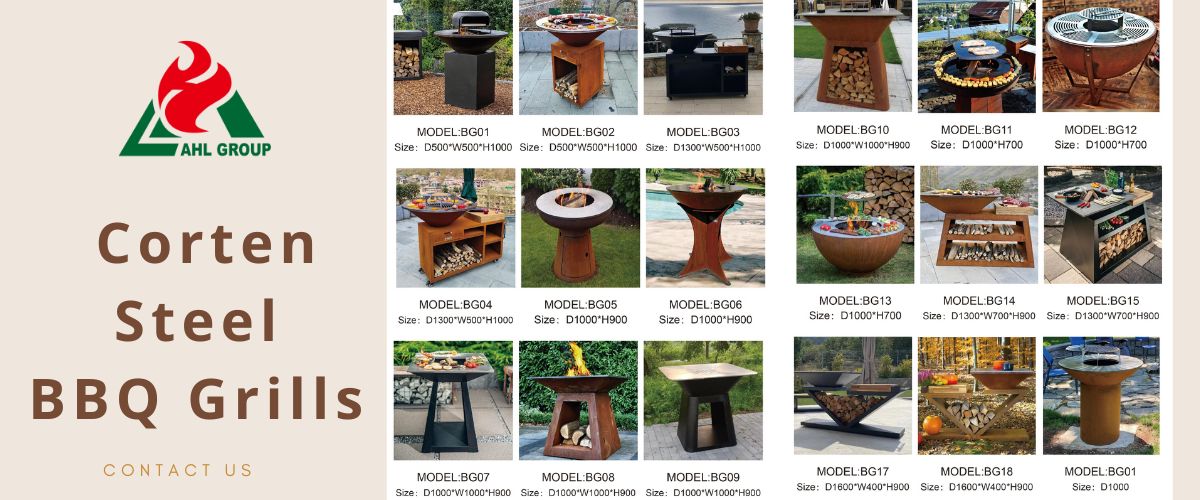
Rust-Resistant Pick: Corten Steel BBQ Grills
1. Why Choose a Corten Steel BBQ Grill?
The core advantage of a BBQ grill lies in its inherent “self-protection” capability. When exposed to outdoor environments, it naturally forms a stable, dense oxide layer (rust-colored finish). This layer locks in the internal steel, preventing further corrosion.
Take AHL's BG5-Outdoor Kitchen BBQ Grill, for example. Not only is the material reliable, but its substantial 3-20mm thick plates further enhance rust resistance and durability.
Additionally, Corten BBQ grills boast exceptional weather resistance, effortlessly withstanding sun exposure, rain, and extreme temperature fluctuations. Daily maintenance requires only simple cleaning, eliminating the need for frequent upkeep—making them far more hassle-free than ordinary metal grills.
Their uniform rust patina adds a vintage aesthetic, transforming the garden barbecue grill into a decorative focal point in any yard.
2. Corten Steel vs. Stainless Steel Barbecue Grills
While stainless steel grills offer some rust resistance, they are prone to pitting corrosion over time, especially in coastal areas. Corten steel barbecues, however, continuously regenerate their protective layer, delivering superior long-term rust resistance.
Take AHL's BG2-High Quality BBQ Grill as an example. Available in two sizes—100D100H and 85D100H—it adapts to both compact courtyards and spacious areas. Its Corten steel construction makes it more durable than similarly sized stainless steel grills in outdoor environments.
For users prioritizing durability and low maintenance, while the initial investment in a corten grill may be slightly higher, it offers greater value over time by reducing costs associated with replacing parts and frequent upkeep.
3. Material Details to Consider When Selecting
Regardless of the grill type chosen, prioritize the material of the core components. Beyond corten steel barbecues, powder-coated grills also enhance rust resistance by preventing rapid corrosion of exposed metal surfaces.
BG4-Rust Barbecue Grill exemplifies premium quality, crafted entirely from genuine Corten steel and available in two sizes: 100 (D) x 130 (L) x 100 (H) and 85 (D) x 130 (L)*100 (H) dimensions, making it ideal for outdoor kitchen setups. Its 3-20mm thickness ensures structural stability and foundational rust resistance.
Avoid low-cost, inferior metal BBQ grills. These products offer poor protection and may develop rust spots quickly, compromising both user experience and safety.
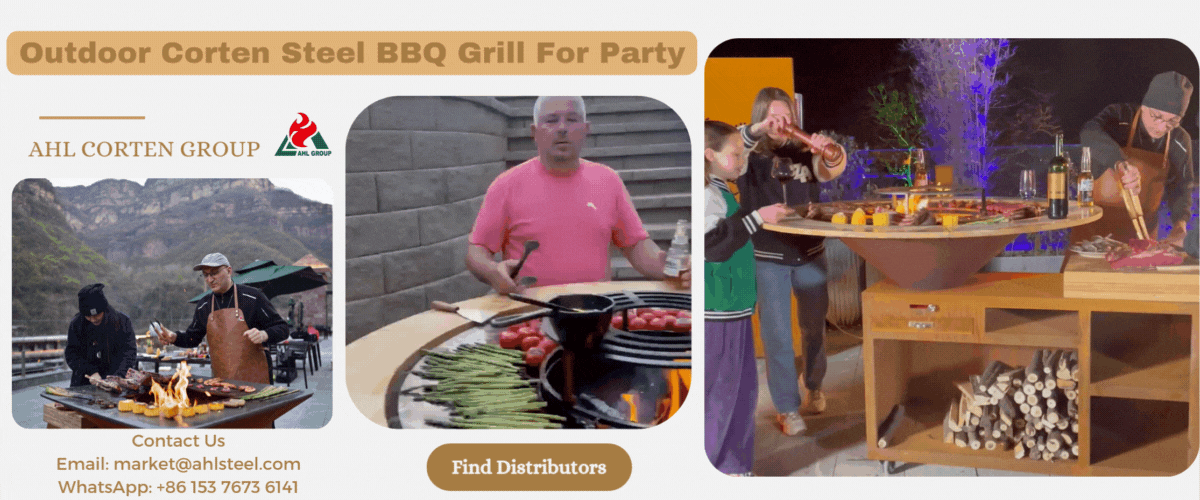
Regular Cleaning: The Core of Rust Prevention
1. Quick Cleanup After Each Use
Clean the BBQ grill while it's still warm after grilling to easily remove food residue. Scrape the grill surface with a wooden spatula, half an onion, or lemon (the acid softens stubborn stains). A nylon brush can also be used (avoid steel wool brushes, as loose bristles may contaminate food and pose safety risks).
After scraping, wipe the grill with a paper towel dipped in vegetable or canola oil to form a thin protective layer. This shields against moisture and prevents food from sticking. Simultaneously, wipe the exterior of the corten steel barbecue with a soft cloth to promptly remove surface grease and residue.
Pay special attention to models like the AHL BG5-BBQ Grills with curved designs, as edges and seams are prone to residue buildup and require thorough cleaning.
2. Monthly Deep Cleaning (or after several uses)
Once the grill has completely cooled, disconnect the power (for electric models) and remove any detachable parts. Focus on cleaning the grease tray, drip pan, and ash box, as these components accumulate grease and ash. Grease traps moisture, accelerating rust formation.
Lining the grease tray with aluminum foil simplifies future cleanup. Wash components with mild soapy water, then rinse and dry thoroughly.
For BBQ grills, never use abrasive cleaners or rough cloths, as they may scratch the surface oxide layer and compromise rust protection. This is especially critical for the BG4-Rust Barbecue Grill's integrated outdoor kitchen design, which has numerous components requiring careful protection of oxide layers at all joints during cleaning.
For pellet grills, vacuum out accumulated ash to prevent moisture buildup from residual embers.
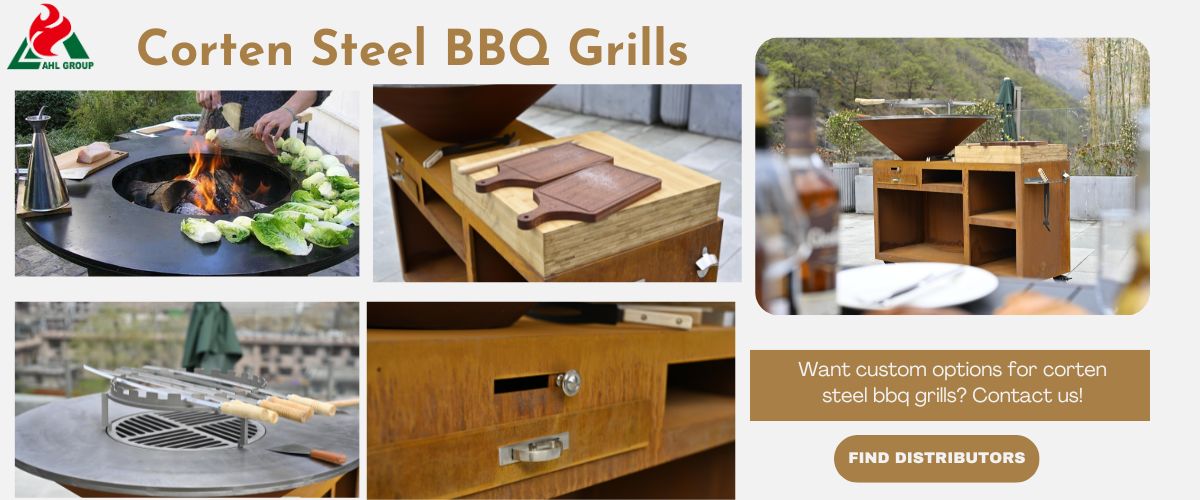
Protective Treatments & Seasoning: Applying a “Protective Coat” to Your Grill
1. Initial Seasoning + Periodic Re-seasoning
Seasoning is essential before first use: Heat the grill to a high temperature per the manual, maintain for a set period, then turn off the heat source. Once cool enough to handle, use a cloth dipped in high-smoke-point oil (e.g., canola or vegetable oil) to evenly coat the grill surface and all metal components.
For AHL's compact BG2-Corten BBQ Grill, ensure even heat coverage across the entire surface during seasoning; while the larger BG4-Rusted Barbecue Grill can be seasoned in sections to ensure a protective layer forms on every part. This step creates a non-stick, rust-resistant barrier. After each deep cleaning, if the grill surface appears dry, repeat the seasoning process to reinforce protection.
2. Safe and Effective Rust Prevention
Daily rust prevention requires no complex products—food-grade cooking oil is the optimal choice. After cleaning and drying, apply a thin layer to the grill and exposed metal surfaces to block oxygen and moisture.
For cleaning, use natural cleaners (such as Traeger All-Natural Cleaner) or mild soapy water. Avoid harsh chemicals, which may damage the Corten steel BBQ's oxidation layer or leave harmful residues.
For models like the BG5-Metal BBQ Grills commonly used in outdoor kitchens, perform a deep clean monthly with a natural cleaner after frequent use, followed by re-oiling for protection.
Before using any commercial rust-proofing spray, always check your grill's warranty terms to ensure the product won't damage the material or compromise food safety.
Shielding the BBQ Grill from External Corrosion
1. Choose a Breathable Grill Cover
Equip your Corten steel barbecue with an all-weather waterproof cover, ideally a custom-fit one tailored to the grill's dimensions. For example, the AHL BG2-BBQ Grill requires a round cover, while the BG4-Corten Barbecue Grill needs a dedicated one-piece cover designed for outdoor kitchens. Crucially, select a breathable design—non-breathable covers trap moisture, accelerating rust formation. Breathable covers allow air circulation, reducing condensation buildup.
In cold regions during winter, use an insulated cover to prevent direct ice/snow contact with the grill, avoiding freeze-thaw damage.
2. Smart Storage: Indoor vs. Outdoor Considerations
During extended periods of non-use (e.g., winter), store your garden barbecue grill in a dry indoor location like a garage or storage room. For compact models like the AHL BG2-BBQ Grill, prioritize indoor storage due to its portability. The larger BG4-Barbecue Grill requires outdoor protection if indoor storage isn't feasible—use a thick, breathable cover and moisture-proof pad.
Before storage, ensure the grill is completely cooled, empty all fuel (pellets, gas, etc.), and thoroughly dry all components. If the storage area is humid, use a dehumidifier to prevent moisture condensation on the Corten steel surface. For outdoor storage only, place the grill in a shaded, dry location away from low-lying areas prone to water accumulation.
3. Addressing Environmental Risks
- Coastal Areas: Salt spray is the metal BBQ grill's “natural enemy.” Rinse the grill's exterior with fresh water monthly, drying immediately afterward to enhance rust resistance. For AHL's BG5-BBQ Grills In Corten Steel used in coastal gardens, increase cleaning frequency.
- Areas with winter salting for de-icing: Promptly remove salt residue from the grill surface to prevent accelerated corrosion.
- Urban environments: Airborne dust and chemicals increase rusting risks. Regularly wipe the grill surface with a soft cloth to remove contaminants.
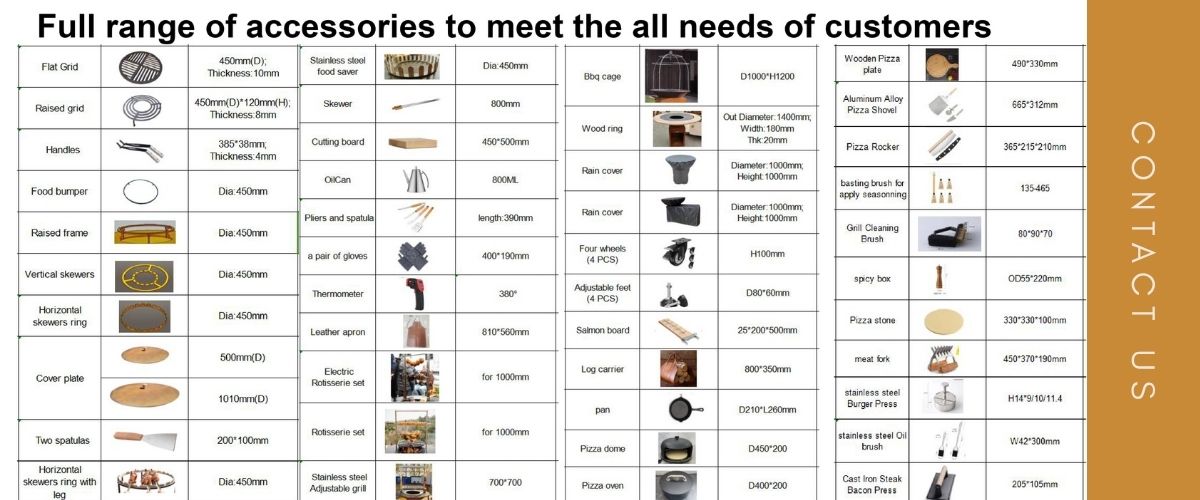
Professional Maintenance Habits: Extend Rust Protection
1. Regular Inspections and Prompt Problem Resolution
During each cleaning, inspect the surface of your corten steel BBQ grill. If you notice scratches, dents, or peeling coating, promptly apply a thin layer of cooking oil to these areas—they are high-risk zones for rust. Early treatment prevents corrosion from spreading.
Pay special attention to the joints and screw areas of the AHL BG4-rust outdoor barbecue grill, as friction can easily damage the oxide layer in these spots. Also, check components like the drip tray and oil pipes for holes. If rust has perforated them, replace the corresponding parts promptly (contact the AHL brand to purchase dedicated corten grill accessories).
2. Thoroughly Dry to Eliminate Moisture
After cleaning or exposure to rain, use a microfiber towel to wipe the Corten barbecue completely dry, paying special attention to seams and crevices where water may accumulate.
The AHL BG5-Outdoor Kitchen BBQ Grills' 100 (D) x 90 (H) cm design allows water accumulation at the base. After cleaning, flip or elevate the grill to ensure complete drying underneath. Never allow the grill to air-dry naturally—even residual water droplets can cause rust spots over time.
3. Periodically Relocate the BBQ Grill
If an area of your yard remains consistently damp (e.g., rainwater pooling, dew condensation under trees), regularly move your garden barbecue grill to prevent prolonged moisture exposure in the same spot, reducing localized rusting. For lightweight models like the AHL BG2-High Quality BBQ Grill, relocate monthly; while the BG4-Rust Barbecue Grill is bulkier, a quarterly repositioning will still effectively reduce moisture damage.
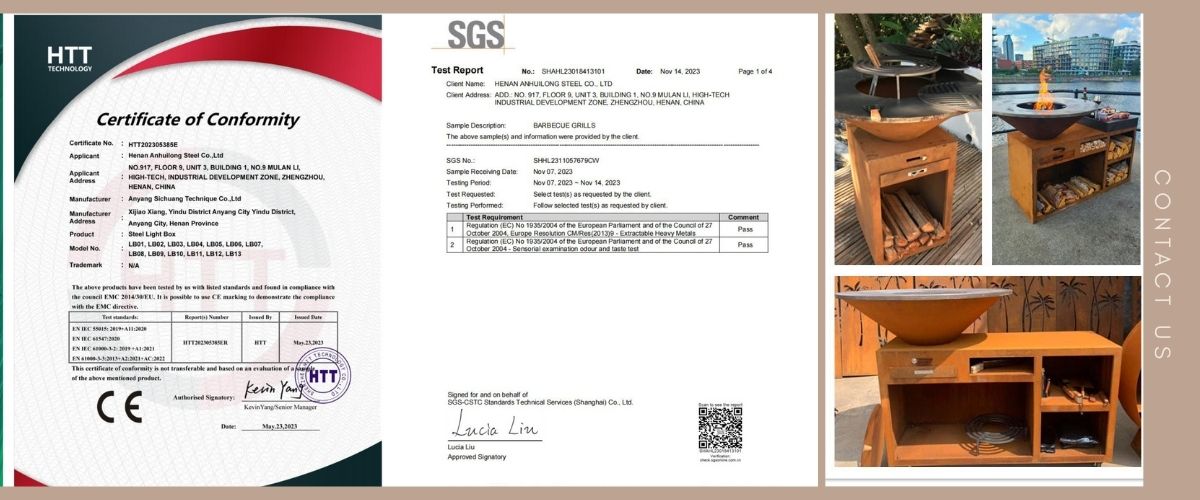
Avoid These Common Rust Prevention Pitfalls
- Relying solely on coatings: Protective layers like paint or coatings wear down with use. Ideal results require regular maintenance, such as cleaning and oiling. Even the natural rust patina on corten BBQ grills needs periodic cleaning and protection.
- Use airtight grill covers: These trap moisture and accelerate corrosion. Opt for breathable covers instead—especially crucial for tightly sealed models like AHL BG5-BBQ Grills.
- Neglecting grease and ash cleanup: Residual grease and ash absorb moisture, forming a long-term “catalyst” for rust on metal surfaces. The outdoor kitchen design of the BG4-Rust Barbecue Grill is prone to grease buildup, requiring extra attention to cleaning.
- Ignore minor rust spots: Untreated initial rust spots spread rapidly, ultimately compromising the grill's structural integrity.
Frequently Asked Questions for Corten Steel Barbecue Grills
1. Can Outdoor Grills Be Completely Rust-Proof?
No. Even modern BBQ grills will experience minor corrosion when exposed to outdoor environments long-term. However, proper maintenance can significantly slow rust progression and extend service life. For example, AHL's BG2-High Quality Rust Corten Steel BBQ Grill can last decades with proper care.
2. Why Is Corten Steel More Rust-Resistant?
Corten steel barbecues naturally develop a stable oxide layer (rust patina). This layer acts as a barrier against moisture and air, preventing further corrosion of the underlying steel. It also regenerates itself, ensuring long-lasting rust resistance.
3. Is Corten Steel Grill Worth the Extra Investment?
Yes. While the initial purchase cost may exceed standard metal grills, its low maintenance, superior rust resistance, and extended lifespan save on replacement and upkeep costs over time, offering better value.
4. How Often Should the BBQ Grill Be Maintained?
- Frequent use (1-2 times weekly): Quick weekly cleaning, monthly deep cleaning + full inspection;
- Occasional use (1-2 times monthly): Clean after each use, perform deep maintenance and inspection during seasonal changes.
5. Can White Vinegar or Wax Be Used to Rust-Proof a Corten Steel BBQ?
White vinegar can be used to clean minor stains, but test on a small area first to avoid damaging the patina. Wax is not recommended as it may clog the patina's “breathing” pores, impairing its self-protective properties. Opt for food-grade cooking oil instead.
Keeping Your Corten Steel BBQ Grill in Top Condition
Rust prevention for outdoor BBQ grills hinges on “proactive protection + consistent maintenance.” Choosing rust-resistant materials like Corten steel is fundamental. Combined with regular cleaning, scientific protection, and proper storage, you can effectively delay rust formation.
Looking to invest in a rust-resistant, durable grill? Get a free quote today. If you have specific rust prevention challenges with your grill, contact our expert team for personalized solutions!
Back




